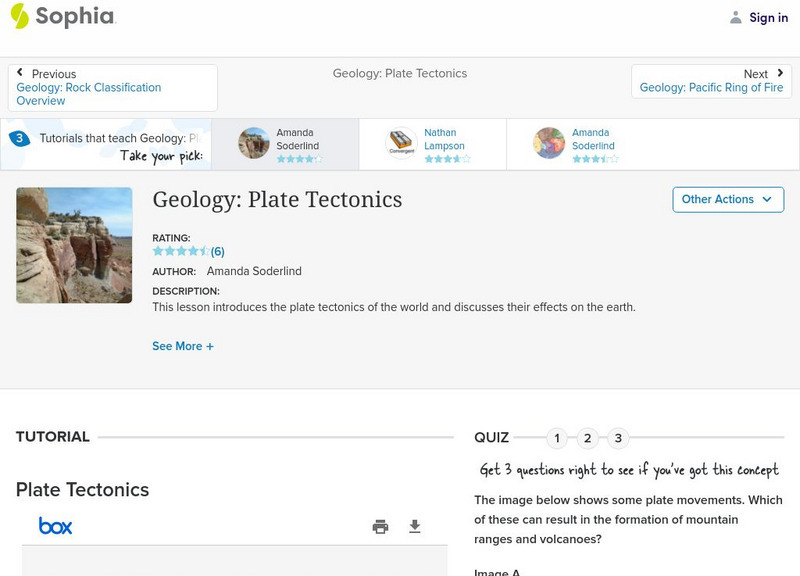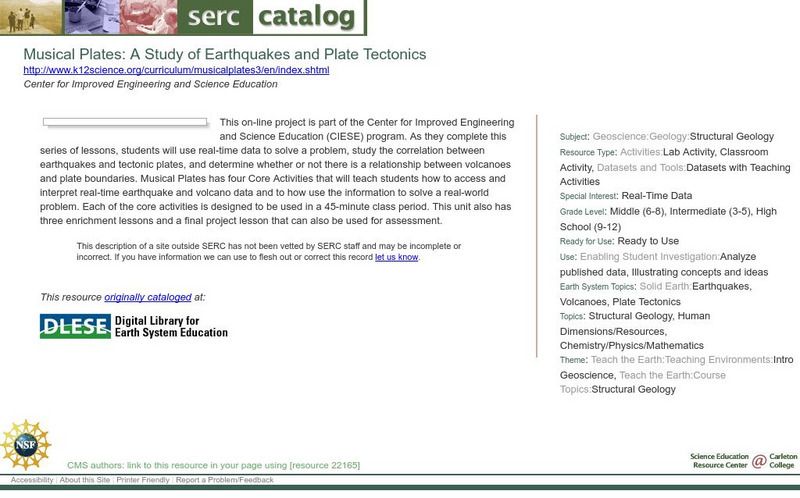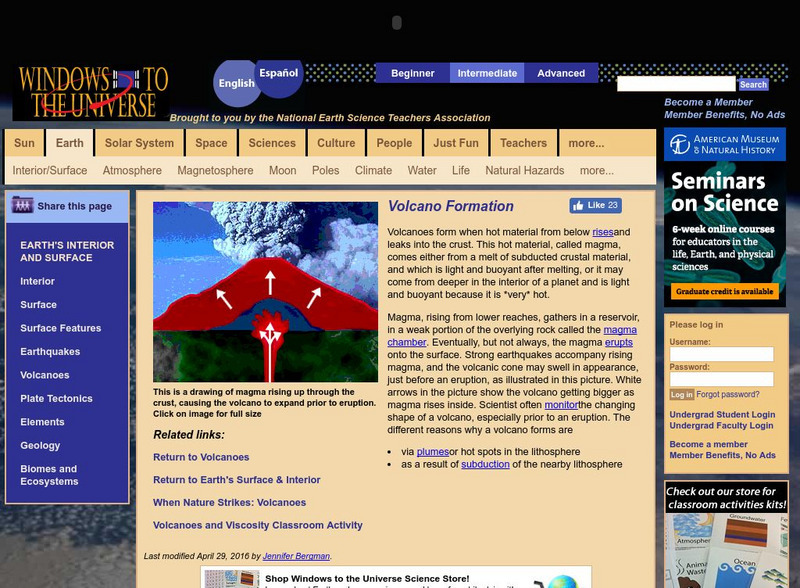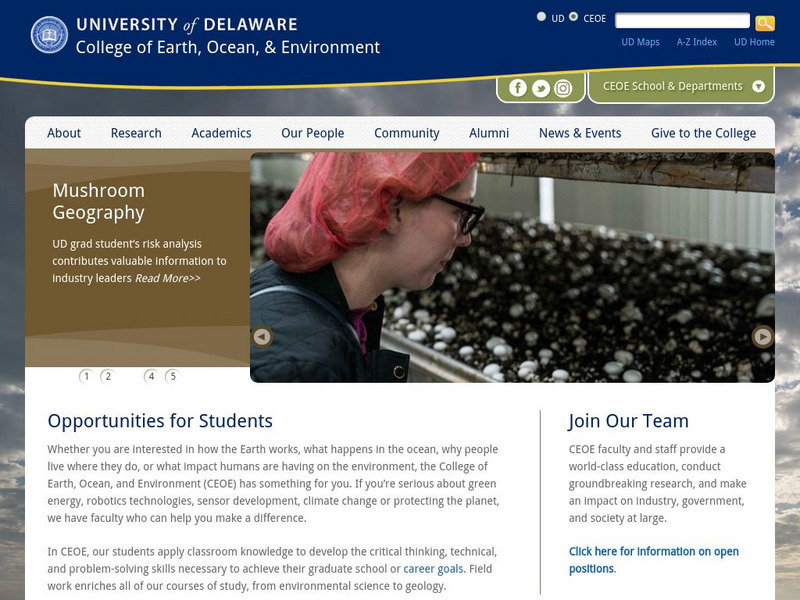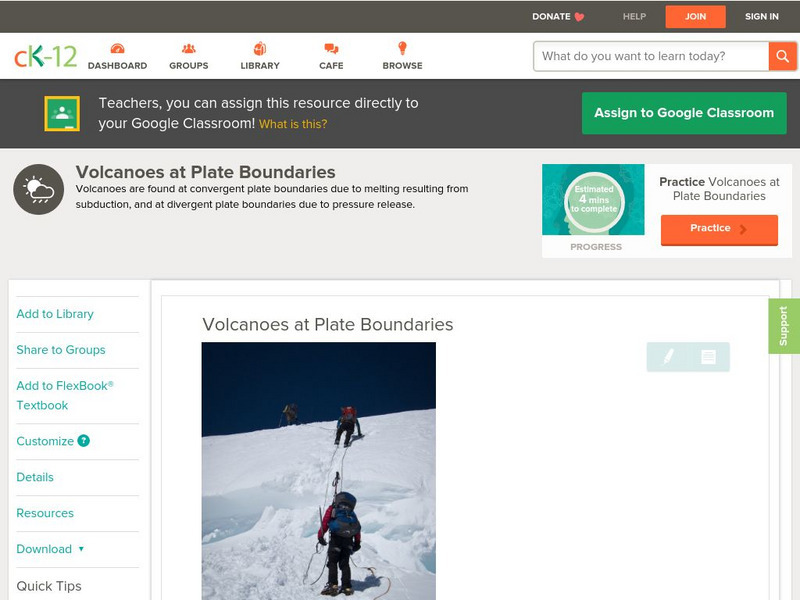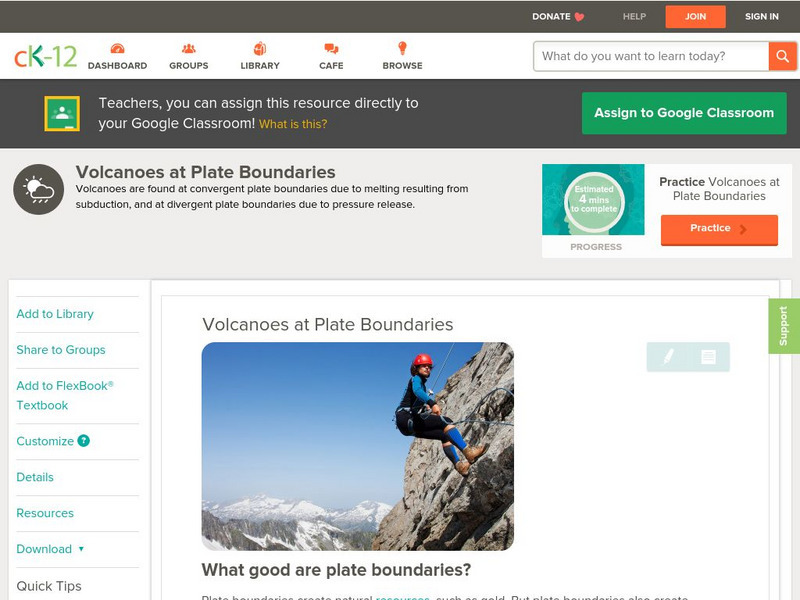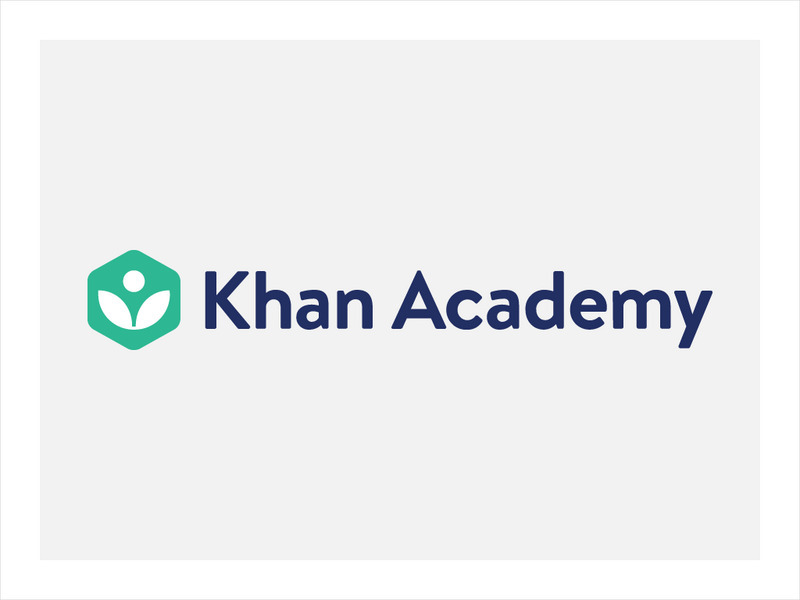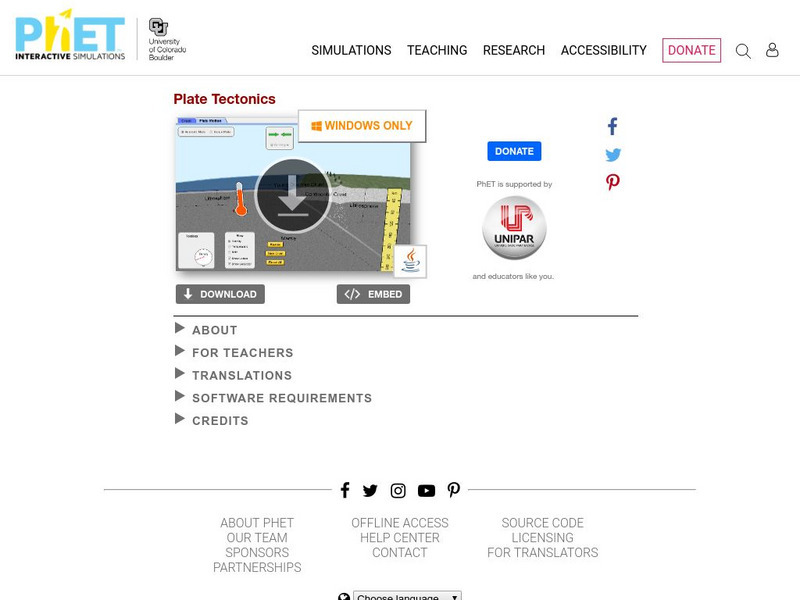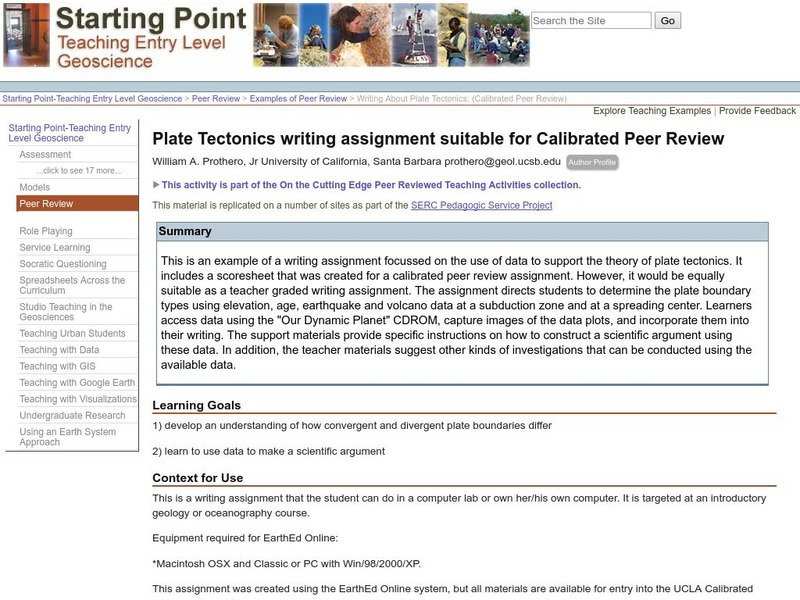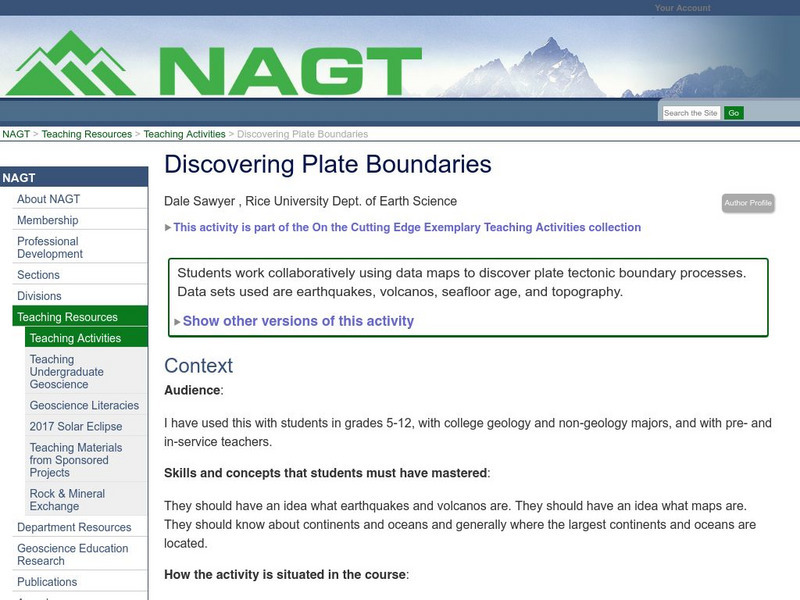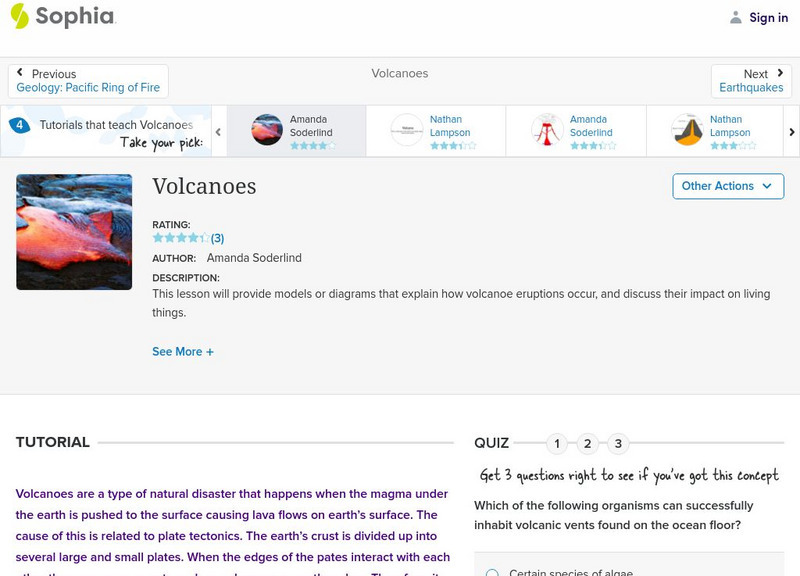E-learning for Kids
E Learning for Kids: Madagascar: What Are Tectonic Plates and How Are They Moving?
This lesson teaches students about tectonic plates, plate boundaries, and their role in earthquakes and volcanoes.
Incorporated Research Institutions for Seismology
Iris: Gps Measuring Plate Motion [Pdf]
This resource looks at how geologists are able to measure the movement of tectonic plates using satellite-based data and how they were able to surmise in the past that the plates were moving. It also discusses how to read GPS time-series...
University of Colorado
University of Colorado: Ph Et Interactive Simulations: Plate Tectonics
Explore how plates move on the surface of the earth. Change temperature, composition, and thickness of plates. Discover how to create new mountains, volcanoes, or oceans! Java is required.
Sophia Learning
Sophia: Geology: Plate Tectonics
An basic introduction to plate tectonics and the Earth's processes related to this phenomenon.
Annenberg Foundation
Annenberg Learner: Volcanoes
This interactive from Annenberg Learner asks the question of whether erumptions of volcanoes can be predicted. Review what you already know about volcanoes, and move on to forecasting potential. Several short video clips are included as...
Science Education Resource Center at Carleton College
Serc: Musical Plates: A Study of Earthquakes and Plate Tectonics
Four part lab activity involves students using real-time data to solve a problem, study the correlation between earthquakes and tectonic plates, and determine whether or not there is a relationship between volcanoes and plate boundaries.
Center for Innovation in Engineering and Science Education, Stevens Institute of Technology
Ciese Real Time Data Projects: Musical Plates: A Study of Earthquakes
In this project, students use Real-time and volcano data from the Internet to explore the relationship between earthquakes, plate tectonics, and volcanos.
US Geological Survey
U.s. Geological Survey: Volcanoes of the u.s.
This graphical and textual journey about the US volcanoes was made by Steven Brantley. There is an introduction, volcanoes and plate tectonics, Hawaiian volcanoes, cascade volcanoes, restless volcanoes, a glossary and further readings.
National Earth Science Teachers Association
Windows to the Universe: Volcano Formation
Explanation of the factors that result in the formation of volcanoes, some basic but helpful animations and photographs.
Other
University of Delaware: Plate Tectonics
This site is a very simple overview of plate tectonics. It includes a map of all the major plates and a diagram of the layers of the earth.
Annenberg Foundation
Annenberg Learner: Dynamic Earth Interactives
Interactive tutorials on plate tectonics, plates and boundaries, and the Earth's structure convey the dynamism of geologic processes, such as earthquakes and volcanoes. Takes a multidimensional approach to coverage of basic geologic...
CK-12 Foundation
Ck 12: Earth Science: Volcanoes at Plate Boundaries
[Free Registration/Login may be required to access all resource tools.] Volcanoes most often occur at plate boundaries.
CK-12 Foundation
Ck 12: Earth Science: Volcanoes at Plate Boundaries
[Free Registration/Login may be required to access all resource tools.] Volcanoes most often occur at plate boundaries.
Khan Academy
Khan Academy: Answers to Exploration Questions: Plate Tectonics
Explore answers about plate tectonics with this questions by Himalayan Mountains.
University of Colorado
University of Colorado: Ph Et Interactive Simulations: Ph Et: Interactive Simulations: Plate Tectonics
Students studying plate tectonics will better understand its concepts with this virtual experiment that tests how plates move on the surface of the earth. Temperature, composition, and thickness of plates can be changed to create new...
CK-12 Foundation
Ck 12: Earth Science: Volcano Characteristics
[Free Registration/Login may be required to access all resource tools.] What volcanoes are and where they are located.
US Geological Survey
Usgs: Plate Tectonics, Hot Spots, and Ring of Fire: World Map
A world map featuring active volcanoes, plate tectonics, hot spots, and ring of fire.
Science Education Resource Center at Carleton College
Serc: Writing to Support the Theory of Plate Tectonics
This lesson helps young scholars use images that depict earthquakes, seafloor ages, topography, and volcanoes, and then make a scientific argument supporting the Theory of Plate Tectonics.
Science Education Resource Center at Carleton College
Serc: Writing About Plate Tectonics
This lesson is a writing assignment focussed on the use of data to support the theory of plate tectonics. It includes a scoresheet that was created for a calibrated peer review assignment. The assignment directs students to determine the...
National Association of Geoscience Teachers
Nagt: Discovering Plate Boundaries
Students work collaboratively using data maps to discover plate tectonic boundary processes. Data sets used are earthquakes, volcanoes, seafloor age, and topography.
Science Education Resource Center at Carleton College
Serc: Plate Kinematics
For this activity, young scholars will observe and understand the basic kinematics of plate movement, how oceans are formed during continental rifting, and the relationship between plate geometry and tectonic data such as earthquakes,...
Science Education Resource Center at Carleton College
Serc: A Data Rich Exercise for Discovering Plate Boundary Processes
This article in the Journal of Geoscience Education describes a classroom exercise based on four world maps containing earthquake, volcano, topographical and seafloor age data. Students participate in this exercise by using a "jigsaw"...
Science Education Resource Center at Carleton College
Serc: Discovering Plate Boundaries
A data rich exercise built around four global data maps to help students discover the processes that occur at plate tectonic boundaries. The lesson plan is based on the jigsaw concept, mixing the students to work in different groups...
Sophia Learning
Sophia: Volcanoes: Lesson 5
This lesson will provide models or diagrams that explain how volcanic eruptions occur, and discuss their impact on living things. It is 5 of 5 in the series titled "Volcanoes."



![Iris: Gps Measuring Plate Motion [Pdf] Handout Iris: Gps Measuring Plate Motion [Pdf] Handout](https://d15y2dacu3jp90.cloudfront.net/images/attachment_defaults/resource/large/FPO-knovation.png)

